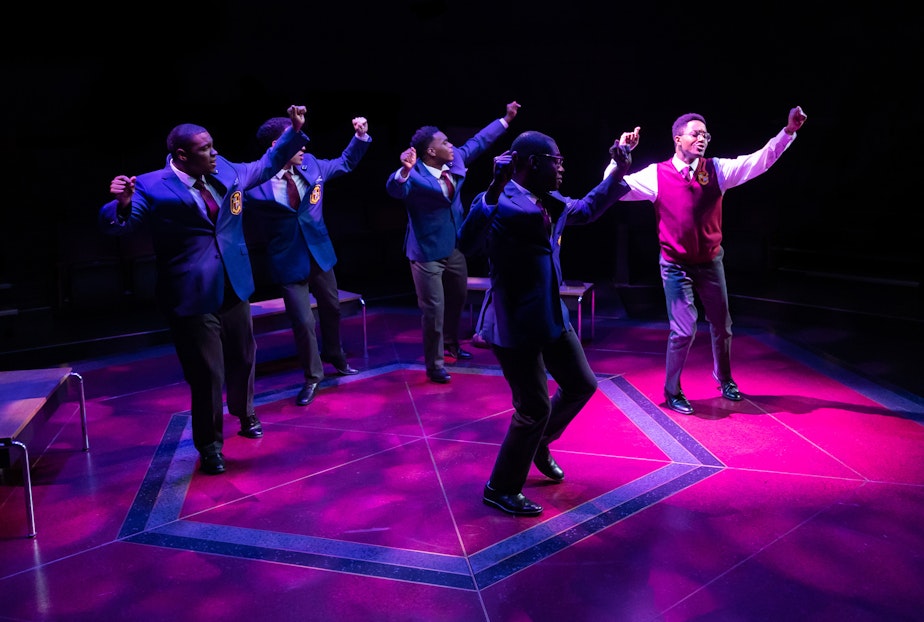'Choir Boy' explores life, love, and queer identity for Black teens

Oscar-winning playwright Tarell Alvin McCraney’s play “Choir Boy," showing at ACT Theatre, is a coming-of-age story where none of the characters actually come-of-age – and that is the play’s brilliance.
The story follows the choir at Charles R. Drew Prep School, and focuses on Pharus Young, the ambitious lead singer who is openly gay. The action is fueled by acapella singing and choreography, as the actors use their bodies and set pieces as instruments to provide an organic soundtrack. The root of the play is Young’s experience within the masculine environment of a southern, Christian, all-boys school.
Instead of having each of the characters' stories end neatly with an arc that perfectly captures their growth, director Jamil Jude leaned into the authenticity of allowing the teens in the play to have unresolved issues.

“I want people to walk away with more desire to invest in the lives of Black boys,” Jude said.
He added that he wanted audiences to witness Black boys successfully challenging authority, and in some cases, challenging themselves — all while still acknowledging their youth as they venture toward self-actualization and maturity. But one year in high school is not enough time to settle such issues, so the play focuses on the experiences themselves instead of force-feeding resolutions.
Sponsored
The moments of tension in the play are heightened by the circular design of ACT’s stage. With the audience seating forming a tight bowl around the stage, you can look across the performance and into the faces of fellow audience members as they react to the action in each scene. This set up plays a key role in this play: there are moments where characters use slurs – both racial and sexual – that may be hard to experience, especially in Seattle, where predominately white audiences are getting a view into the lives and experiences of Black folks.
“When you talk about the stage, it's just dropped in the middle of the set and the audience's surrounding it like a boxing match,” Jude said. “In the audience, you look across and you see other people too. So, you’re reminded of the privilege it is to [be witnessing] a really intimate moment. So, I asked audiences to check their white privilege at the door, and to just be present, and to know that they're getting access to something that they wouldn't have otherwise been given access to.”
The play has parallels with 'Moonlight,' the semi-autobiographical Oscar-winning film McCraney co-wrote with the film's director Barry Jenkins. Like Moonlight, "Choir Boy" explores the complexities of a young, queer Black boy realizing and navigating his sexuality while living in hyper-masculine and homophobic environments.
One of the most important aspects of discovery happens between the Pharus, the lead character, and his roommate AJ, who in addition to being in the choir, is also on the baseball team. Pharus and AJ develop a friendship that displays the dynamics of youth who grow up in homophobic environments, who learn to break the cycle of homophobia while building friendship and understanding of peers.
“I think we really honed in on the importance of that," said Kyle Ward, the actor who plays AJ. "Especially me being from the south, I can relate to AJ and his upbringing and his surroundings. And one of the main things me and Jamil [Jude] talked about was, [AJ] is probably from a place where they don't [accept] a gay person. In their neighborhood, [a gay person] is probably going to be an outcast, or someone frowned upon. So, we see the importance of AJ coming to a whole different environment, and not just being around a gay person, but rooming with this person.”
Sponsored
“Choir Boy” challenges audiences to accept Black boys from multiple walks of life, and asks that the audience give these boys the space and patience needed by youth walking a path toward self-discovery.




